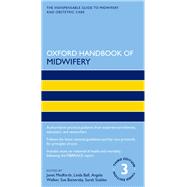Now in its third edition the Oxford Handbook of Midwifery continues to be the essential one-stop guide to the key principles of the care and management of pregnancy, birth and beyond. Concise yet comprehensive, with its recognisable and easy-to-use Oxford Handbook format, midwives will find this a treasure trove of clear, practical guidance. Whether you are a student needing a helping hand through the subject, or an experienced practitioner needing to refresh your knowledge in an emergency, you can be sure that this handbook will be there for you.
Written by experienced midwives, and following the latest guidelines and key care protocols, this is handbook is up-to-date and authoritative, with sections on sexual health, contraception, neonatal care and infant feeding. Each chapter includes assessment, diagnosis and management of care with treatment interventions. Now including new information on initiation of breast feeding with biological nurturing as well as a highlighted section on how to manage obstetric emergencies. Important psychosocial care issues are also addressed. This edition provides concise, practical and accessible information in a logical sequence, as the layout follows the woman's journey through pregnancy, birth and early motherhood.








